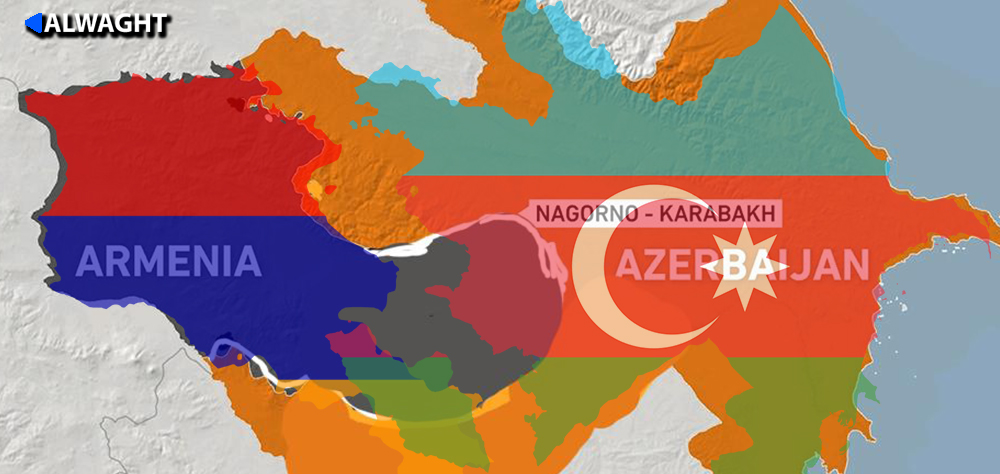Alwaght- Experiencing relative peace for the past three months, Caucasus region saw renewed tensions between Azerbaijan and Armenia recently.
On Sunday, fresh clashes reported between the neighbor's forces in Kalbajar region, where an Azerbaijani soldier was killed and three Armenians were injured.
"Even though the war is over, we are ready and we must be ready for war at any moment," said Azerbaijani Defense Minister General Zakir Hasanov, blaming Armenia for the escalation.
Clashes after ceasefire
During the 44-day military conflict that began on October 26 last year, Azerbaijan liberated its territories from the decades-long occupation of Armenia in Nagorno-Karabakh disputed region.
Finally, the clashes ended on November 11 last year with the signing of a tripartite statement by the presidents of Azerbaijan and Russia and the Prime Minister of Armenia.
Recently, Armenian media, citing official sources, reported that Azerbaijan's forces have advanced up to 3.5 kilometers into the Armenian territory in one of the border areas. Meanwhile, news sources in Azerbaijan claim that during the First Nagorno-Karabakh War in the 1990s, Armenian forces illegally took control of some border areas of Azerbaijan in addition to Nagorno-Karabakh.
Azerbaijani forces retreat
Armenia has said that Baku has not fully fulfilled its commitment to withdraw its forces from its territory according to the ceasefire agreement, and Yerevan has asked Moscow for military assistance. Interim Prime Minister of Armenia Nikol Pashinyan said on Thursday that a unit of Azerbaijani forces had crossed the border despite a ceasefire agreement and had "encroached" on the territory of the country near the Black Sea. Azerbaijan denied the allegations in response and called them "provocative." Baku says its forces have moved only to their positions in the Kalbajr-Lachin region of the Nagorno-Karabakh Republic.
Russian Interfax news agency, citing Pashinyan, reported that following negotiations between the two countries' officials over the border tensions, "it was agreed that Azerbaijani forces leave Armenian soil."
"The agreement has been realized to an extent. There are regions the Azerbaijanis really left. But having in mind that the agreement is not fully adopted [by Azerbaijan], today I reached out to the Russian president for military assistance," said PM Pashinyan.
Russia is Armenia's ally and the last year ceasefire deal was brokered by Moscow.
Azerbaijan Foreign Affairs Ministry stated that the country's border guard commander met with the Armenian counterpart on Friday to discuss the fresh border skirmish.
Armenia argues that around 250 Azerbaijan troops have advanced about 3 kilometers into its soil.
Pashinyan contacted Russian President Vladimir Putin late Thursday. The Kremlin said in a statement that Putin told the PM that the ceasefire agreement must be fully respected, and that Pashinyan, in turn, supported any "peaceful, political, and diplomatic solution."
Kremlin's press secretary Dmitry Peskov in a briefing on Friday said the Armenian side was "severely concerned" about the situation. "President Putin is also concerned," he continued.
Jalina Porter, the spokeswoman to the US Department of State, also commented on the tensions, saying that Washington expects Azerbaijan to quickly pull back its forces and stop further provocations. Holding that military movement in the disputed regions is irresponsible, unnecessary, and provocative; she told the journalists that border-related issues should be settled by dialogue.
Some other countries have also shown sensitivity to this ongoing border dispute. French President Emmanuel Macron on June 1 called on Azerbaijani forces to leave Armenian border.
Iran, a shared neighbor to Azerbaijan and Armenia, asked the two countries to solve their dispute peacefully.
Why are tensions escalating afresh?
In addition to its military base in Armenia, Russia sent a group of peacekeepers to Caucasus last year to help implement the ceasefire. It has good relations and a reciprocal defense pact with Armenia, but it also has friendly relations with Azerbaijan.
An agreement signed last year between Azerbaijan and Armenia to end the conflict was mediated by Russia. But ambiguities in parts of the tripartite ceasefire agreement in the disputed region are the main reasons for the resurging tensions in the region.
The region in the center of dispute is where Armenia calls Syunic and Azerbaijan calls Zangezur. According to the last year agreement, a route should cross this region to connect Baku to Nakhchivan region and Turkey. Azerbaijan is pushing for implementation of this part of agreement, otherwise, as President Ilham Aliyev threatened, it will use force to create this transportation corridor.
The tripartite meetings of a task force have resulted in "very serious steps" on this corridor, according to Aliyev. After the end of the war last year, Azerbaijan prepared to construct the corridor. At the same time, Baku's tone has gradually become harsher. On April 20, Aliyev announced that Baku would achieve its goal, regardless of whether Armenia wanted it or not, and said "Zangezur is a usurped land."
But Pashinyan has a different account. He says according to the deal, Azerbaijan can gain access to a corridor that Armenia can gain access to through Azerbaijan and Nakhchivan. The Armenian foreign ministry spokeswoman Anna Naghdalyan claimed that in the November 9, 2020, agreement there was no talk of any corridor.
The prospects of a railway and route corridor seem dim and its construction, hence, is a time-taking process. Armenia insists on other terms of the agreement, especially on release of captives, but Azerbaijan wants a corridor. Actually, the conditions of their relations do not allow for settlement of issues of this level.
From another perspective, the political situation in Armenia is yet to be clear and settled, and if Pashinyan agrees to the Azerbaijani demands, he commits a political suicide.
In general, what seems to be reigniting the tensions is the ambiguity on how the agreements on the corridor and release of the Armenian captives should be implemented. Armenia's internal political uncertainty even complicates this situation.



























